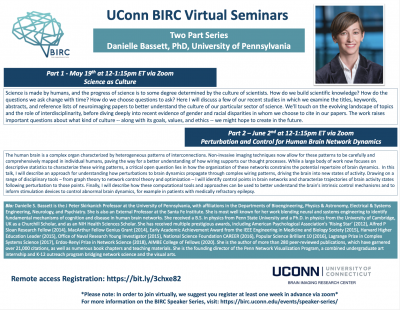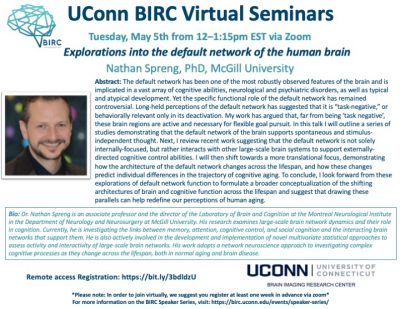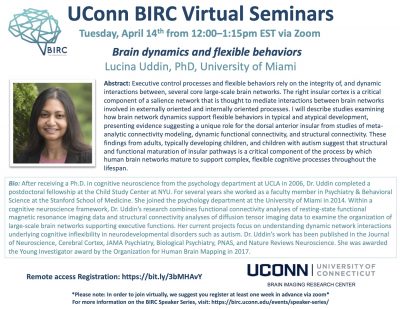Danielle S. Bassett, PhD
University of Pennsylvania
Science as Culture – PART ONE OF A TWO PART SERIES
Tuesday, May 19th from 12–1:15pm ET via Zoom
**Register here for Zoom using your institution/university email address**
Bio: Danielle S. Bassett is the J Peter Skirkanich Professor at the University of Pennsylvania, with affiliations in the Departments of Bioengineering, Physics & Astronomy, Electrical & Systems Engineering, Neurology, and Psychiatry. She is also an External Professor at the Santa Fe Institute. She is most well known for her work blending neural and systems engineering to identify fundamental mechanisms of cognition and disease in human brain networks. She received a B.S. in physics from Penn State University and a Ph.D. in physics from the University of Cambridge, UK as a Churchill Scholar, and as an NIH Health Sciences Scholar. She has received multiple prestigious awards, including American Psychological Association’s ‘Rising Star’ (2012), Alfred P Sloan Research Fellow (2014), MacArthur Fellow Genius Grant (2014), Early Academic Achievement Award from the IEEE Engineering in Medicine and Biology Society (2015), Harvard Higher Education Leader (2015), Office of Naval Research Young Investigator (2015), National Science Foundation CAREER (2016), Popular Science Brilliant 10 (2016), Lagrange Prize in Complex Systems Science (2017), Erdos-Renyi Prize in Network Science (2018), AIMBE College of Fellows (2020). She is the author of more than 280 peer-reviewed publications, which have garnered over 21,000 citations, as well as numerous book chapters and teaching materials. She is the founding director of the Penn Network Visualization Program, a combined undergraduate art internship and K-12 outreach program bridging network science and the visual arts.
Abstract: Science is made by humans, and the progress of science is to some degree determined by the culture of scientists. How do we build scientific knowledge? How do the questions we ask change with time? How do we choose questions to ask? Here I will discuss a few of our recent studies in which we examine the titles, keywords, abstracts, and reference lists of neuroimaging papers to better understand the culture of our particular sector of science. We’ll touch on the evolving landscape of topics and the role of interdisciplinarity, before diving deeply into recent evidence of gender and racial disparities in whom we choose to cite in our papers. The work raises important questions about what kind of culture — along with its goals, values, and ethics — we might hope to create in the future.
Click here to see the full BIRC Speaker Series schedule and access recordings of past talks.


